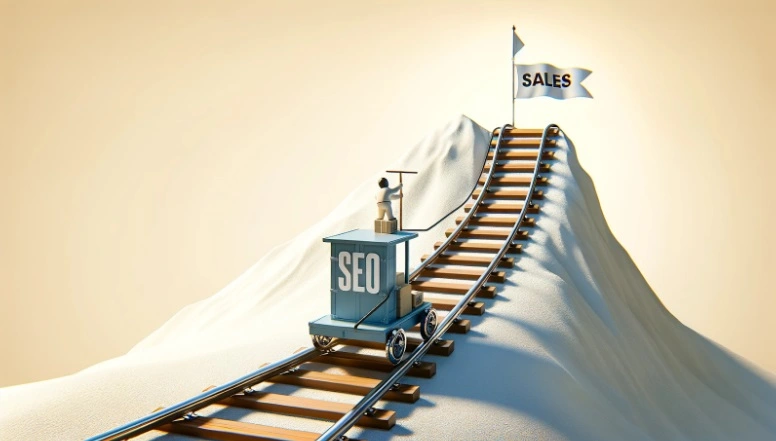Many SEO experts crown the title tag as the undisputed king of on-page elements. After all, it’s the first thing users see on the search results page, and it plays a crucial role in enticing those all-important clicks. Users will not land on the website if the title is not enticing enough. If user’s do not land on the website, how would search engines find out about the relevancy of the page. Without user flow, how will search engine get the behavioral signals about the page. It makes Title Tag (Meta Title) tag the most important tag of the page.
Did you know that the humble title tag is clicked on 43% more than any other element on a search engine results page? That’s right – this unassuming HTML element wields immense power when it comes to reeling in those precious clicks from searchers. But is the title tag really the heavyweight champion of on-page SEO? Let’s step into the ring and find out!
Read: List of AI Tools for Marketing and SEO
When it comes to climbing those coveted search engine rankings, on-page SEO is your trusty ally. It’s all about optimizing the elements on your website to make it irresistible to both search engines and users alike. But with so many important on-page SEO factors jostling for attention, it’s natural to wonder – which on-page element carries the most weight for SEO?
The Power of the Title Tag
It happens a lot when you’re scrolling through the search results, and a title catches your eye. It’s snappy, it’s relevant, and it promises to solve your problem. Chances are, you’ll click on it faster than you can say “google.” That, my friends, is the magic of a well-crafted title tag, often considered the on-page element that carries the most weight for SEO.
The title tag, nestled within the <head> section of your HTML, is the official title of your web page. It’s what shows up on the search engine results page (SERP), in browser tabs, and when your page is shared on social media. A compelling title tag can mean the difference between a flood of traffic and crickets chirping in the digital void.
Here’s why the title tag is so important for SEO
Read: Crawling Meaning in SEO
Keyword Prominence
By strategically placing your target keyword at the beginning of your title tag, you’re signaling to search engines that your page is highly relevant to that query. This can give you a nice boost in the rankings.
Click-Through Rates
An enticing title tag is like a siren song for searchers. If it accurately reflects your content and piques their curiosity, they’re more likely to click through to your site. Higher click-through rates can, in turn, lead to better rankings over time.
Brand Visibility
Consistently including your brand name in your title tags helps establish brand awareness and makes your site more memorable to users.
Read: SEO Interview Questions and Answers
The Contenders for the SEO Crown
While the title tag is undeniably important, it’s not the only on-page element that can move the SEO needle. Let’s take a look at some other heavy hitters:
Content Quality
At the end of the day, search engines are in the business of delivering the best possible results to users. High-quality, relevant content that provides value to readers is essential for SEO success. Google’s algorithms are getting smarter by the day, and they can sniff out thin or duplicate content from a mile away.
Header Tags
Header tags (H1, H2, H3, etc.) help structure your content and make it more scannable for users. They also provide clues to search engines about the hierarchy and main topics of your page. A well-optimized H1 tag that includes your primary keyword can carry significant weight.
Meta Description
While meta descriptions don’t directly impact rankings, they can influence click-through rates from the search results page. A compelling meta description that includes your keyword and entices users to click can indirectly boost your SEO.
URL Structure
Clean, descriptive URLs that include your target keyword can help search engines understand what your page is about. They’re also more shareable and easier for users to remember.
Internal Linking
Strategic internal linking helps search engines understand the structure and hierarchy of your site. It also helps distribute link equity (or “authority”) throughout your pages.
Read: Periodic table for SEO
So, Which Element Reigns Supreme?
While the title tag is certainly a formidable contender, the truth is, there’s no single on-page element that reigns supreme in the world of SEO. The most effective approach is a holistic one – where all the on-page elements work together in harmony to create a seamless, user-friendly experience.
That being said, if we had to choose a frontrunner, it would be high-quality, relevant content. At the end of the day, search engines are designed to surface the best answers to users’ queries. If your content genuinely solves a problem, provides value, and keeps readers engaged, you’re already ahead of the game.
In the world of on-page SEO, the title tag is undoubtedly a formidable gladiator. Its ability to capture attention, convey relevance, and inspire clicks makes it a strong contender for the on-page element that carries the most weight for SEO. However, true SEO success lies in the synergy of all your important on-page SEO factors.

By crafting compelling title tags, header tags, and meta descriptions, optimizing your URLs and internal linking, and above all, creating exceptional content that resonates with your audience, you’ll be well on your way to claiming that coveted top spot on the search engine podium.
So, roll up your sleeves, put on your SEO helmet, and get ready to optimize like a true champion!
FAQs
Which on-page element carries the most weight for SEO?
While all on-page elements contribute to SEO, the title tag is often considered one of the most important factors. A well-crafted, keyword-rich title tag can significantly impact click-through rates and help search engines understand the content of your page. However, it’s crucial to approach on-page SEO holistically and optimize all important on-page SEO factors for the best results.
What is the topmost factor in on-page SEO?
High-quality, relevant content is often considered the topmost factor in on-page SEO. Search engines prioritize providing users with the most valuable and informative content. By creating content that comprehensively addresses user queries and provides a great user experience, you lay the foundation for strong on-page SEO.
Which is the most important part of the page for SEO?
While there isn’t a single most important part of a page for SEO, the title tag, header tags (H1, H2, etc.), and the main content are all crucial elements. The title tag helps attract clicks from the search results, header tags provide structure and context to your content, and the main content delivers value to your audience while incorporating relevant keywords.
Which one of the following is the most important SEO element: title tag, meta description, or header tags?
Among these three elements, the title tag is generally considered the most important for SEO. The title tag is the first thing users see in the search results and plays a significant role in attracting clicks. However, the meta description and header tags also contribute to SEO by providing context and structure to your content. It’s essential to optimize all three elements for the best results.
What is the element of on-page SEO?
On-page SEO consists of various elements, including title tags, meta descriptions, header tags, content optimization, internal linking, image optimization, and URL structure. By optimizing these elements and ensuring they work together harmoniously, you can improve your website’s visibility, search engine rankings, and user engagement.
Mohit Verma
I am an experienced professional with 9+ years of experience in Search Engine Optimization. I am on a mission to provide industry focused job oriented SEO so the students/mentees can get their dream SEO job and and start working from day 1.
